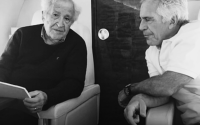23 June 2008
US sweet, light crude for August delivery increased by $2.46 to $137.08 a barrel, while London Brent crude rose $1.03 to $135.89 a barrel.
The rises came despite Saudi Arabia's promise to increase daily output by an extra 200,000 barrels a day from July.
Record oil prices have pushed up fuel prices, hitting living costs worldwide.
"The oil summit really has not done much to temper oil pricing," said Victor Shum, an energy analyst with Purvin & Gertz.
No commitment
Fishermen, truck drivers and consumers across Europe and Asia have been protesting against the increase in petrol and diesel costs as oil prices have jumped by about 40% since the beginning of the year.
The oil price has risen more than five-fold since 2000.
This prompted Saudi Arabia, the world's top exporter, to hold a summit over the weekend to discuss the situation with top energy policy makers.
Before the meeting, Saudi Arabia had pledged to lift daily quotas to 9.7 million barrels by the end of July, an increase of about 500,000 barrels since May.
But without specific commitment from other members of the producers' cartel Opec to lift production following the meeting, the market considered that Saudi Arabia's move would not be enough to meet soaring demand, especially from fast-growing emerging economies such as China and India.
"I think where the market may be a little more comforted, which could see prices drift lower in the medium term, is more clarity and scope on Opec capacity," said Mark Pervan, an analyst at Australia's ANZ Bank.
Geopolitical worries
Prices were also kept high by news that Nigerian oil fields operated by Chevron and Royal Dutch Shell remained shut after they were attacked last week.
The attack on Shell's installation at Bonga, 120km (75 miles) out to sea, was the first time militants had struck at an offshore oil site, and the move cut a 10th of Nigerian oil production in one go.
 High fuel prices have sparked protests in several countries |
The militant group the Movement for the Emancipation of the Niger Delta (Mend) has been targeting Nigeria's oil infrastructure, which supplies crude to the whole of Africa, since 2006, and this has been one factor behind the recent surge in world oil prices.
But in a sudden U-turn, the group called a unilateral ceasefire over the weekend to be effective from midnight on Tuesday until further notice.
Analysts said if it did hold, it may help Nigeria to raise production, which would help to provide some relief to prices. But taking into consideration the scale of past attacks, many analysts remained sceptical.
Oil traders were also eyeing the situation between Israel and Iran following reports that an Israeli military exercise over the eastern Mediterranean was a possible test-run for a strike on Iran.







